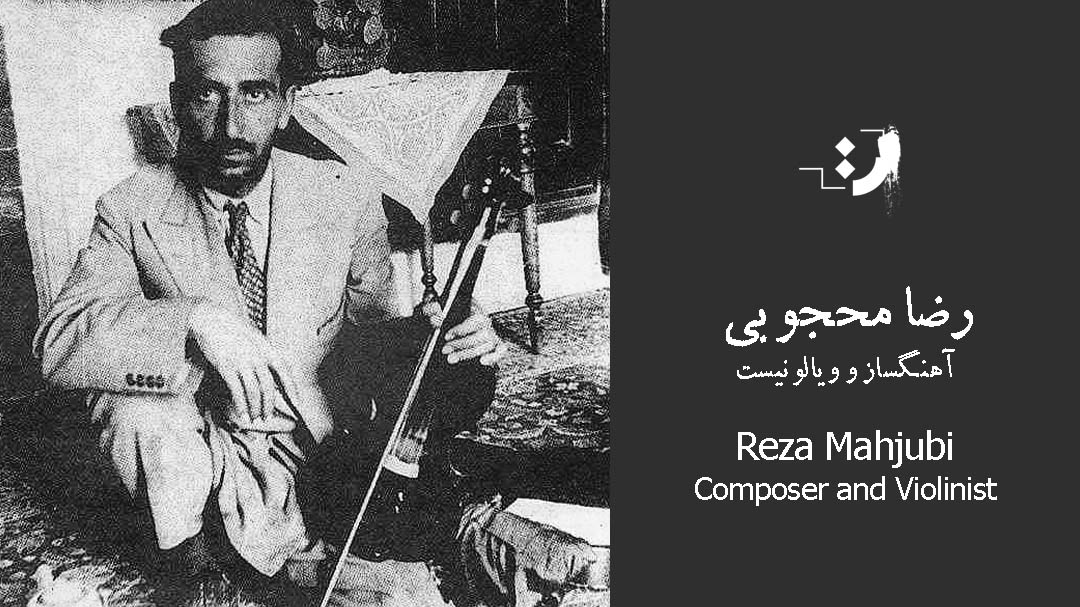Reza Mahjubi

Biography
MAḤJUBI, Reżā (b. Tehran, 1277 Š./1898, d. Tehran, 1333 Š./ 1954) composer and well-known player of the violin.
Reżā’s parents were both familiar with music and Reżā, like his brother, Morteżā Maḥjubi, became interested in music from early childhood. His first teacher in music was Ḥosayn Hangāfarin (q.v.), a noted music master of the time. He then continued his music education with Ebrāhim Āžang, but since he did not have much interest in learning musical notation and preferred to learn music in the traditional way by listening, he dropped out of Āžang’s class and joined the students of the master kamānča (a kind of spike-fiddle) player Ḥosayn Esmāʿilzāda (q.v.), with whom he studied for the next few years. “He was very diligent in his work; he would get up at dawn everyday and practice playing his instrument for hours” (Ḵāleqi, I, pp. 455-56, quoting Reżā’s brother, Mortażā Maḥjubi). By the time he reached the age of sixteen, he had become quite skillful in playing the violin.
Reżā Maḥjubi worked as a master musician until around the age of twenty-five teaching students (he also gave a couple of concerts), when certain psychological problems began hampering his work, problems which eventually led to his mental breakdown and brought him to a very tragic death (Ḵāleqi, p. 456; Rāhgāni, p. 519; Behruzi, p. 158, n.7)
Reżā Maḥjubi was one of the best improvising virtuoso of his own time; and although his fruitful span of life was rather short, he created a number of very melodious pieces, some of which have served as models for other composers. They include pišdarāmads “preludes” (see DARĀMAD) in the modes (dastgāh) of Eṣfahān, Dašti, Šur, and Segāh (q.v.) and Čahārmeżrābs (improvised rhythmic instrumental music, q.v.) in the modes of Dašti and Segāh, and a song called “Bahār-e nowrasida” (Early spring) in the mode of Abu ʿAṭā with lyrics by Waḥid Dastgerdi. His Dašti prelude was turned into a song called “Yak zamān čupān-i” (Once a shepherd) by Reżā Šahrzād, who composed the lyric. It was performed by the outstanding vocalist of the time, Qamar-al-Moluk Waziri, and preserved on a gramophone record.
Maḥjubi emulated two of his predecessors, namely Ḡolām-Ḥosayn Darviš Khan and Rokn-al-Din Moḵtāri, who were celebrated for their preludes; but his own preludes were somewhat shorter. Maḥjubi also had his own music classes for some years and trained a number of musicians, the most distinguished of whom Ruḥ-Allāh Ḵāleqi and Majid Wafādār.
Not many of Reża Maḥjubi’s musical compositions for the violin have survived. The very few pieces that are kept in private archives, due to the rudimentary methods of recording, are in a very poor condition and cannot be considered representing the artistic talent of Maḥjubi.
Bibliography:
Šāpur Behruzi, Čehrahā-ye musiqi-e Irān, Tehran, 1993, pp. 158-61.
Ruḥ-Allāh Ḵāleqi, Sargoḏašt-e musiqi-e Iran, 2 vols., 2nd ed., Tehran, 1983, I, pp. 455-58.
Ruḥangiz Rāhgāni, Tāriḵ-e musiqi-e Irān, Tehran, 1998.
Sāsān Sepantā, Češmandāz-e musiqi-e Irān, Tehran, 1990, pp. 188-89.
(Morteżā Ḥoseyni Dehkordi and EIr)
Originally Published: July 20, 2005
Last Updated: July 20, 2005
- Birthday: 1898
- Death: 1954
- Birthplace: Tehran, Tehran, Iran
Composer and Violinist
Hossein Tehrani
Faramarz Payvar
Hossein Khan Esmailzadeh
